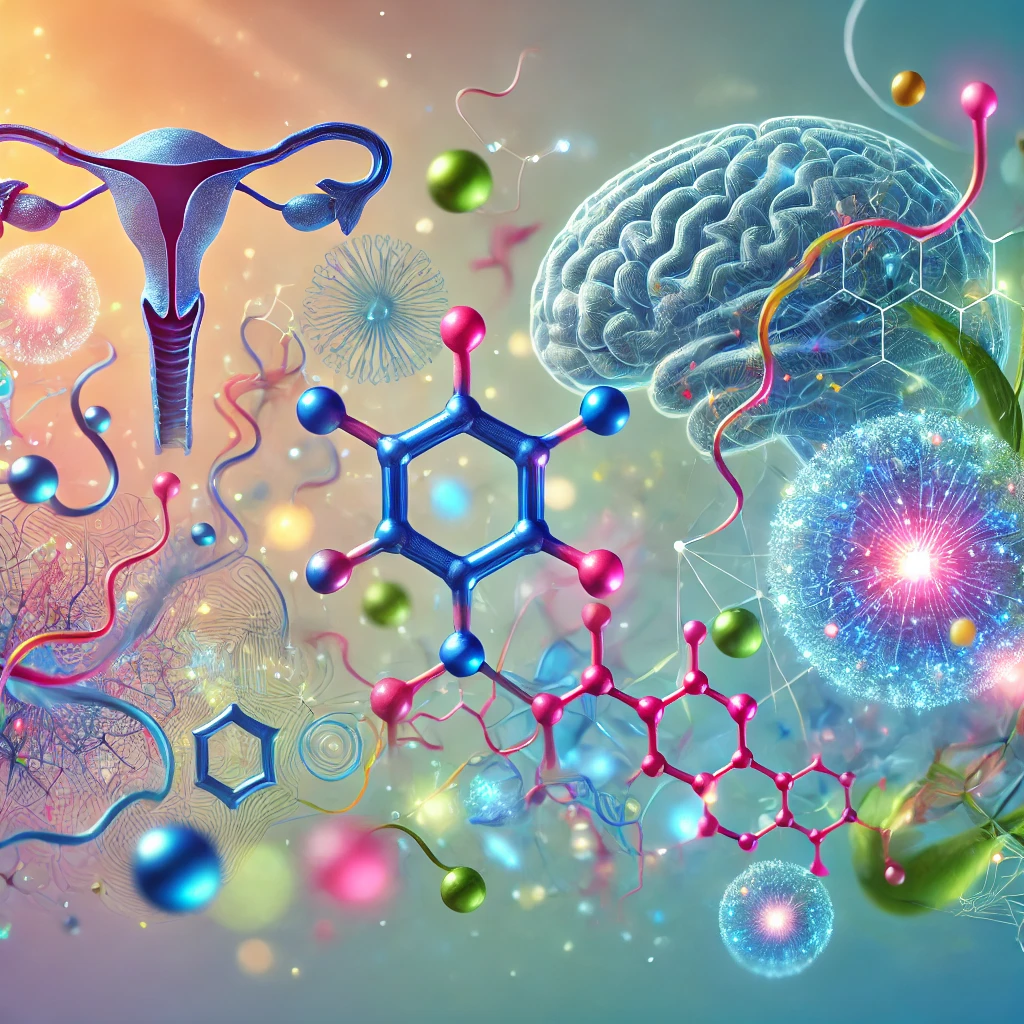ADHD symptoms do not stay the same across a woman’s life.
They shift as hormones shift.
Many ADHD women notice changes in focus, energy, emotional regulation, sleep, memory, or medication response that seem unpredictable. In reality, these changes often follow hormonal patterns that are rarely explained clearly in clinical care.
This page is a map.
Each linked page goes deeper into one specific stage or concern.
How Hormones Interact with ADHD (The Short Version)
ADHD brains are especially sensitive to fluctuation, not just levels.
Two hormones matter most:
Estrogen and ADHD
Estrogen supports dopamine signaling in brain regions responsible for attention, working memory, motivation, and emotional regulation. When estrogen is higher, many ADHD women experience improved focus and cognitive clarity. When estrogen drops or fluctuates sharply, ADHD symptoms often intensify.
Progesterone and ADHD
Progesterone has sedating and mood-altering effects through its influence on GABA. For some ADHD women, higher progesterone or rapid hormonal shifts contribute to irritability, low mood, fatigue, or brain fog.
These effects are physiological, not psychological.
They do not reflect motivation, effort, or resilience.
Why ADHD Women Are More Affected
Research and lived experience suggest that ADHD women are more sensitive to hormonal change across the lifespan. This sensitivity helps explain:
-
Symptom shifts across the menstrual cycle
-
Worsening symptoms during perimenopause
-
New cognitive or emotional difficulties in menopause
-
Increased rates of PMDD
-
Changes in medication effectiveness
-
Later-in-life ADHD identification
Hormonal transitions do not cause ADHD, but they can unmask, intensify, or reshape how ADHD shows up.
Hormonal Stages That Matter Most
Hormonal effects on ADHD are most noticeable during predictable transitions. Each stage has distinct patterns and support needs.
Monthly Cycles
Hormonal changes across the menstrual cycle can influence focus, energy, emotional regulation, and executive functioning.
→ ADHD and Your Period: Navigating Hormonal Changes
→ ADHD and PMDD
Pregnancy and Postpartum
Pregnancy and the postpartum period involve rapid hormonal shifts that can stabilize ADHD symptoms for some and worsen them for others. Medication decisions and support planning matter here.
→ ADHD and Pregnancy
→ ADHD Medication During Pregnancy
→ ADHD and Postpartum
Perimenopause
Perimenopause brings unpredictable hormonal fluctuations that can significantly affect mood, memory, sleep, and cognitive load. ADHD women are at higher risk for misdiagnosis and untreated distress during this stage.
→ ADHD Women in Perimenopause: Special Risks of Depression
Menopause
After menopause, estrogen levels decline and stabilize. Some ADHD symptoms improve, while others—especially memory, sleep, and emotional regulation—may require new supports.
→ The Truth About ADHD and Menopause
→ Memory Loss, Menopause, and ADHD
Hormones, Medication, and Treatment Considerations
Hormonal changes can affect how ADHD medications feel and function. Some women benefit from timing or dose adjustments during specific phases of life. Others explore hormone-based treatments as part of a broader plan.
→ Hormone Replacement Therapy and ADHD
Treatment decisions should always be individualized and revisited during major hormonal transitions.
A Neurodivergent-Affirming Perspective
ADHD women are not failing to cope with hormones.
Hormonal transitions place real physiological demands on attention, emotion regulation, memory, and stress tolerance. Recognizing these patterns allows for earlier support, better planning, and more accurate care.
Understanding hormones does not mean medicalizing normal experiences.
It means removing unnecessary confusion and self-blame.
How to Use This Resource
-
Use this page as your starting point
-
Follow the links that match your life stage or concern
-
Track patterns rather than symptoms in isolation
-
Bring this framework into medical and therapeutic conversations
You are not imagining these changes.
They are patterned, explainable, and worthy of support.

References for ADHD Women and the Impact of Hormones
- Babinski, D. E., Pelham, W. E., Molina, B. S., Waschbusch, D. A., Gnagy, E. M., Yu, J., Sibley, M. H., & Biswas, A. (2011).
Women with childhood ADHD: Comparisons by diagnostic group and gender.
Journal of Psychopathology & Behavioral Assessment, 33(4), 420-429. - Bro, A. (2020).
Managing ADHD During Pregnancy.
Journal of Women's Health, 29(4), 531-539. - Craig, M., Davies, N., & Cooper, P. (2020).
ADHD and the Role of Estrogen in Cognitive Function.
Psychoneuroendocrinology, 118, 104709. - Dorani, F., Bijlenga, D., Beekman, A. T. F., van Someren, E. J. W., & Kooij, J. J. S. (2021).
Prevalence of hormone-related mood disorder symptoms in women with ADHD.
Journal of Psychiatric Research, 133, 10-15.
https://doi.org/10.1016/j.jpsychires.2020.12.005
- Eng, A. G., Nirjar, U., Elkins, A. R., Sizemore, Y. J., Monticello, K. N., Petersen, M. K., Miller, S. A., Barone, J., Eisenlohr-Moul, T. A., & Martel, M. M. (2024).
Attention-deficit/hyperactivity disorder and the menstrual cycle: Theory and evidence.
Hormones & Behavior, 158, 105466.
https://pmc.ncbi.nlm.nih.gov/articles/PMC10872410/
- Littman, E., Dean, J. M., Wagenberg, B., & Wasserstein, J. (2021).
ADHD in Females Across the Lifespan and the Role of Estrogen.
The ADHD Report, 29(5), 1-8.
https://doi.org/10.1521/adhd.2021.29.5.1 - Gender differences in ADHD: Implications for psychosocial treatments.
Expert Review of Neurotherapeutics, 8(4), 643-655.
https://doi.org/10.1586/14737175.8.4.643
